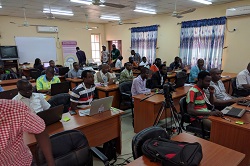Hackfests and science gateways help African scientists innovate
African scientists are putting themselves on the international science map with support from EU-funded project SCI-GAIA. It has spent two years promoting the practice of Open Science in Africa by facilitating the use of science gateways and e-Infrastructures. These allow researchers to gain visibility and share their work and others to apply these to societal problems including road safety, energy for remote areas and medical diagnosis. What may sound technical was, in fact, a response to a straightforward question; ‘we asked ourselves what the simplest thing is we can do to promote African science?’ says Dr Simon Taylor, project coordinator and reader in computer science at Brunel University London, UK. ‘We came up with a toolkit to create an open repository and then asked people: Do you have any data or applications you want to share?’ Dr Taylor and his colleagues have been involved in EU efforts to make high performance computing networks available to researchers in Africa for the past ten years. During this time EU infrastructure projects such as AfricaConnect have improved connectivity for researchers. But other problems remain. ‘Previous projects had demonstrated the value of e-Infrastructures to African science,’ says Dr Taylor, ‘but … these systems are difficult to set up and there isn’t any off-the-shelf training material to show you how. So we set out to create the training materials and educate scientists how to set up their own e-infrastructures.’ Intensive collaboration The first training event was held in April 2016. This was a traditional taught course, which, according to Dr Taylor, ‘was OK but we could have done better. So we adopted the idea of hackfests — intensive collaborative occasions where developers and subject experts get together and develop a product.’ This more interactive format worked well and four were held in Italy, Nigeria and Ethiopia between July 2016 and February 2017. ‘The most exciting thing is seeing how these ‘students’ participated in the hackfest given the educational materials. You throw that in with some highly motivated people and get them to work intensively and it is amazing how much science innovation can be generated,’ says Dr Taylor. Health and solar energy Benjamin Aribisala, professor of computer science at Lagos State University, Nigeria, created a science gateway for sharing his Medical Image Processor and Repository for analysing brain scans. Diana Rwegasira, assistant lecturer in computer science at Dar-es-Salaam University, Tanzania, developed an agent-based simulation for exploring how solar energy markets in remote areas could work. Masters students Dennis Muoki and Charles Njaramba of Kenya’s Egerton University created the Kenyan Public Health Gateway to distribute their app which allows Kenyan medical staff to create maps of blackspots for motorbike accidents. ‘You can see really quickly where accidents are happening. That helps them to get evidence together which could help mitigate a big killer in Africa,’ says Dr Taylor. SCI-GAIA helped 35 participants(opens in new window) create apps and services. Seven science gateways and five open access data repositories were created, as well as 30 science apps hosted by existing science gateways. Project partner WACREN will organise a women-only hackfest in Lagos in November 2017 and Dr Taylor’s team is seeking funding to try and create dedicated African Centres of Open Science. ‘There is huge potential for innovation in Africa and we have definitely hit on a mechanism for unlocking that potential,’ concludes Dr Taylor.



